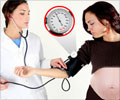Researchers from UT South-western Medical Centre have indicated that infants with low birth weight should be screened for high blood pressure.
Previous studies have shown that low-birth-weight infants are likely to develop hypertension later in life.Blood pressure has not been screened routinely in children with very low birth weights because the measurements were viewed as not feasible or unreliable in infants and toddlers.
"Measuring and validating blood pressure in this population really has not been addressed," said Dr. Charles Rosenfeld, professor of pediatrics at UT Southwestern and one of the study's authors.
"This is unfortunate because the earlier that hypertension is identified, the sooner appropriate medications and lifestyle changes can be introduced to stop the development of dangerous complications," he added.
For the study, the researchers recruited two groups of children aged 1 through 3, whose blood pressure were taken.
The first group consisted of 28 children from the at-risk children's clinic at Children's Medical Centre Dallas. Some children had been born preterm with low birth weights, while others were born at term.
Advertisement
They found that just as in adults, children's blood pressure is affected by their state of mind: Infants who were calm for at least one of the measurements had significantly lower blood pressures than those who were fussy or crying for both.
Advertisement
Another preliminary finding in this group was that, when comparing children with similar mental states, premature low-birth-weight infants had higher blood pressures than infants who had been born at term.
In the second group, 120 very-low-birth-weight infants were observed at the low-birth-weight follow-up clinic at Children's.
Their blood pressure was measured twice, but this time five minutes apart by the same rater. As in the first group, infants who were not calm had significantly higher blood pressure than those who were tranquil.
The findings appear in the September issue of Pediatrics.
Source-ANI
RAS/L















